Time is relative, as Einstein demonstrated, and Vladimir Putin handles it like an accordion in negotiations with Donald Trump. He decides when and where there will be a ceasefire, managing the agreement sparingly. Meanwhile, he increases aerial attacks on Ukrainian cities with devastating consequences. Yesterday, 74 injured in just the capital of the Sumy region. Peace advances slowly, while death flies.
Washington spoke a week ago of a 30-day ceasefire to respect "energy and infrastructure," while Moscow specified that they committed not to bomb "energy infrastructure." The devil is in the details and in the non-compliance as well. After this agreement neither of the two has respected, now comes an attempt at a maritime ceasefire in the Black Sea without the first ceasefire being clarified.
In reality, the playing field is the same now in maritime terms: Russia is at least willing to discuss it because, just like with the energy issue, it is convenient for them to reduce attacks. Representatives from Russia and the US were in meetings for many hours, stopping up to three times to rest and not managing to finalize the so-called "technical matters". During these breaks, each delegation calls their country to report the outcome, the other's red lines, or the strategy to follow.
The slowness is consistent with the Russian way of negotiating and their tactic of gaining time, frustrating the opponent, and not yielding on any important aspect. Washington is in a hurry, weakening its position, as well as that of Ukraine. No one knows who supervises the truces, no one has seen a single document, no one knows what happens in case of non-compliance, and no one knows what happens to the violator and how to return to the path of peace. It seems like everything is full of loose ends.
Russian refineries have been burning for months due to Ukrainian drone attacks (lethal for their economy) just as power plants burn due to Russian drones (terrible for their battered civilian population). An energy truce would give relief to both. In the Black Sea, it is much less balanced: while Ukraine managed to open a grain export route from Odesa at the end of 2023 by sailing close to the coasts of several NATO countries, Russia had to stop exporting due to sanctions, and its proud war fleet had to stay cornered in port before Ukrainian naval drones sank it completely.
The Black Sea is by far the area where Ukraine has achieved the most military victories against Russia, even though they did not have a navy. To the point that they could send the Russian flagship, the Moskva, to the bottom of the sea off the coast of Odesa, along with a good number of combat ships, including several large landing ships that were never used for the dream of taking Odesa. But the interests of Ukraine, Russia, and the US align. Washington wants the safe transit of commercial ships in the Black Sea to be restored as soon as possible to ensure a business that may benefit them. It is profitable for all three to stop attacks at sea, but for Putin, the obsession with a quick peace is another weapon of war.
